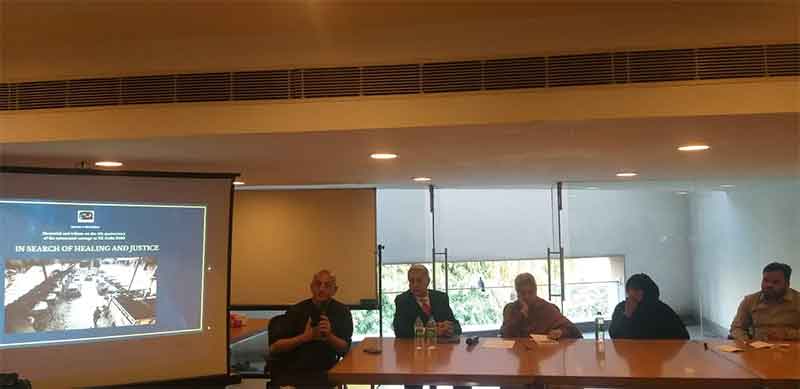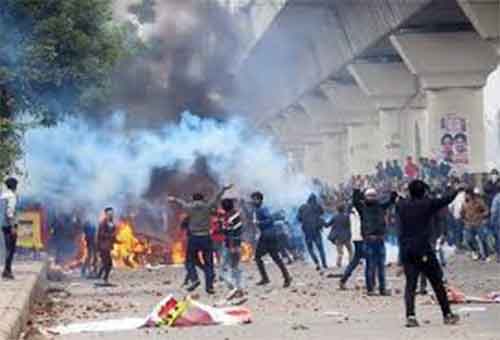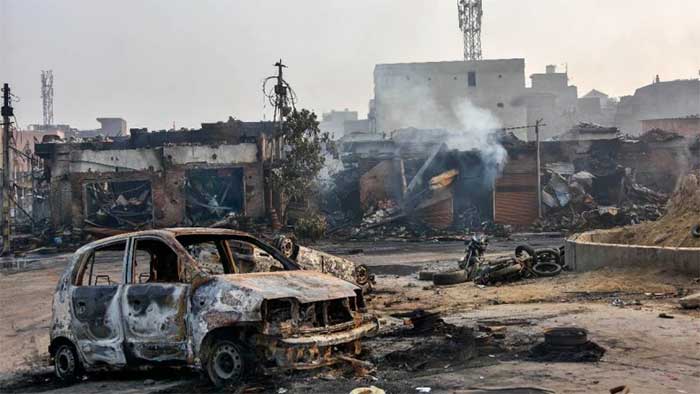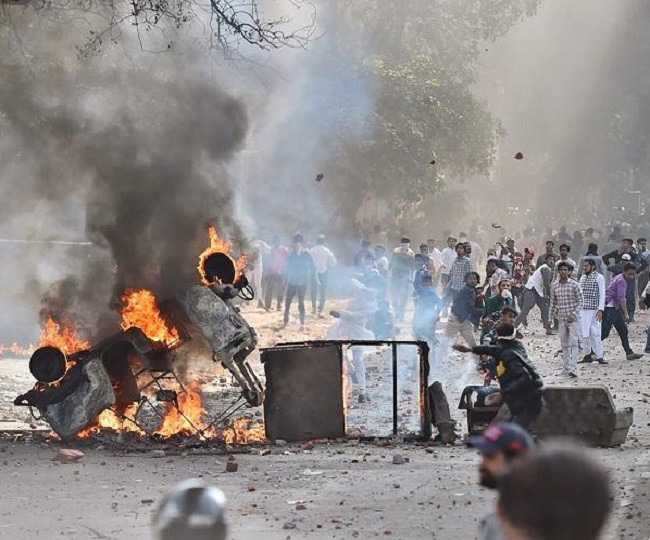Karwan-e-Mohabbat held a commemoration ceremony on 26.02.2025 marking five years since the violence in Delhi in February 2020 in the presence of victim and survivor families.

Introductory Remarks
The event, held in the India Islamic Cultural Centre in Delhi, began with an introductory address by John Dayal, from the Karwan-e-Mohabbat. John Dayal emphasized that the struggle for justice transcends the question of Northeast Delhi – referencing Sajjan Kumar’s prison sentence this past week and the delays faced in recourse for past violence in Meerut and Moradabad. He spoke on the irony of a “reversed justice system” that leads our nation’s police officers to target the victims of riots, while the government’s continuing removal of FCRA permissions from the only organizations working for victims, further sets back their justice.
The short film Mazhab Nahi Sikhata produced by Karwan-e-Mohabbat was screened. The poem depicted in the film described how “No religion teaches us to hate each other. Our garden of singing birds has no place for thorns.”
Harsh Mander spoke on the reason for our gathering. He described how the relationships between our nation’s communities have been broken. How this government’s denial of justice and compensation has been even worse than in the wake of Gujarat 2002. “We want to say to those who have gathered here, that we stand with you in your pain.” The event continued with a ‘Tribute to Those Who Lost Their Lives in the Riots’. The auditorium stood in sombre silence, as the names of all those who died in Delhi’s 2020 violence were read aloud.

A roundtable of survivors then spoke about their lives during and after the 2020 Delhi Pogrom. Survivors shared harrowing stories about the true extent of cruelty displayed during the violence. One survivor described watching rioters beat, shoot, and burn his brother’s body. He then detailed the year-long journey of trying to claim his brother’s foot – the last surviving piece of his corpse – from an apathetic government. Another described approaching the government for compensation, only to have the wrong name written on his check with no clear route for appeal. A young man recounted police officers, who were tasked with escorting his injured family member, laughing at his desperate condition. Upon arriving at the hospital, the doctor attempted to intimidate his family into leaving the victim’s side. The room was moved by the victims’ bravery in sharing their experiences.
“Uncertain Justice: Citizens’ Committee Report”
The findings of the Constitutional Conduct Group’s report “Uncertain Justice: Citizens’ Committee Report” are discussed. The session began with a tribute to the late Sunder Burra, coordinator of the report, conducted by Deb Mukharji. Mukharji also offered a defence of ‘Uncertain Justice’ against High Court Writs and Home Minister Affidavits that have claimed such reports can “lead to a loss of democracy and a state of anarchy,” arguing that a report like this will be the prime evidence history has for what terrible things came to pass during those violent times in Delhi.
Gopal Pillai and Ashok Sharma then presented a summary of the findings of the report, describing the failure of the Central Government, the Ministry of Home Affairs, and Delhi’s Police in preventing the violence in Delhi. Pillai further lambasted the Delhi Police, saying they should “hang their heads in shame” because of the overwhelming evidence of shoddy investigation, fake witnesses, biased action, and wrongful imprisonment of at least 18 innocent Muslim men and women under bogus UAPA claims. Sharma additionally emphasized how agitators like Kapil Mishra and Anurag Thakur, who spurred the violence, have been rewarded with positions in higher public office and face no legal consequences.
Nadeem Khan offered further commentary about the report, describing how Police Departments, DCPs, the Joint Commissioner of Police, Manish Sisodia, Arvind Kejriwal, and officials at all levels of power refused to intervene in what was happening, despite receiving hundreds of complaints. He further shared stories about how members of the police beat hospital workers, citizens, and civil society volunteers who tried to intervene and provide community aid. Khan explained how this is the first instance of communal violence in India’s history where not a single case of persecution was successful, blaming incompetent lawyers and a hostile justice system.
Qurban Ali further emphasized how skewed the government and courts have been, discussing how – in his own case – filing a PIL against hate speech led the Delhi Police to file an FIR against him.
“The Absent State”
Karwan-e-Mohabbat’s report on the Delhi government’s failure to properly compensate victims of the 2020 Delhi Pogrom is released, titled “The Absent State: Comprehensive State Denial of Reparation & Recompense to the Survivors of the 2020 Delhi Pogroms”.
What emerges from this report is the profound and wanton failure of both the central and state governments in all tasks of reparation during and after the 2020 Delhi communal pogrom – of rescue, relief, rehabilitation, compensation and bridging social divides.
The net outcome is that nearly five years after the violence, after the initial distribution mainly of ex gratia relief and death compensation by the state government, virtually no compensation has been paid to the victim survivors, and there seems no prospect of this happening in the foreseeable future.
This is arguably the worst performance of compensation payments after communal violence in the history of the Indian republic.
Suroor Mander began the session by discussing how, in the first six months, the Delhi Government was marginally successful in distributing compensation to riot victims who had been murdered. After which, the Delhi Government, SDM, and NEDRCC failed fundamentally and systemically to award compensation for any other kind of harm. Akanksha Rao commented how the lack of appellate mechanism, “shifting goalposts”, and bureaucratic collapse that occurred during the coronavirus pandemic, led many compensation claims to be wrongfully denied or withdrawn.
Mahenaz Khan continued the discussion by describing how NE Delhi is the most populated district of Delhi NCR, and Tarannum recounted how the Karwan-e-Mohabbat team continues to provide scaled and holistic family support to victims of the pogroms. Fundamental questions like children’s education, women’s support, and illness are exacerbated because of the insecurity created by violence. Suroor Mander emphasized how Karwan-e-Mohabbat only needs to do this work because the government is completely absent in meeting its basic responsibilities.
Gufran discussed how a lack of basic medical facilities in government hospitals – no ambulance, medicine, or doctors – led to injuries, disabilities, and deaths that private hospitals have confirmed were preventable. No government program has provided full compensation for the unique category of medical fees that arise from these lingering injuries.
Dilshad discussed the lived experience of assisting in filing 130 claims with the NEDRCC and the SDM. He described a system where officials would force victims to wait hours each day, for weeks on end, for arbitrary claim rejections. Across Dilshad’s cases, the government used tactics of fear and confusion to make clear that claimants would be harassed if they continued to seek compensation.
Chirayu lamented how the government compensation commission, headed by retired judges of India’s various high courts, never once allowed a single victim to speak or explain their circumstances. These commissions had arbitrarily appointed unqualified independent ‘loss assessors’ who would consistently underreport the compensation required by riot victims. When the commission deviated from these loss assessors’ reports, they would give no reason as to why. Chirayu described the case of Mumtiaz Ali, for whose claim the commission refused to accept any photographic evidence of a burnt down store and ruined stock of merchandise.
Harsh Mander thanked Salman Khurshid for allowing this session to be held in Indian Islamic Cultural Centre. Salman Khurshid thanked Harsh Mander and the Karwan-e-Mohabbat for their continued work. Khurshid specifically describes the subsequent impunity faced by NED Communal Violence victims as a failure of our nation’s commitment to participatory democracy. He compliments the day’s events thus far, not reducing the day to an “us” vs “them, instead focusing on the victims’ suffering with no political end.

Failures of Political Process
Navsharan Singh, in a talk titled ‘Unhealed Social divides’ discusses the state’s counternarrative to today’s proceedings – that we’ve somehow tried to defame this country’s majority. She described stories like these as a creating a country where only oppressed people fight their own oppression. For her, the Farmers’ Protest can show us a path to what true solidarity looks like.
Zoya Hasan and Rahul Mukherji discussed the failures of the political process in the run-up to the NED Delhi Communal Violence of 2020. She emphasized that the CAA was passed without political consultation and led to the single largest instance of Muslim in India mass mobilization since the anticolonial movement of the 1930s. In fear of this movement, the state’s response was marked by repression rather than reconciliation. Mukharji added a passionate appeal for secularism by deconstructing the history of India’s religious pluralism.
A BBC Documentary is screened, titled “Delhi Dangon Ke Mamlon Mein Bari Kyong Ho Rahe Hain Log” describing the failures of legal justice during the NED Communal Violence. Their journalists state that more than 80% of cases filed by the Delhi Police were face and individuals were discharged. Moreso, Judge Vinod Yadav explicitly states that there is evidence that investigative agencies deliberately refused to their job properly.
Prashant Bhushan and Chander Uday Singh discuss the ‘Failures of Criminal Justice’ in the wake of the 2020 Delhi violence. Bhushan described the ways the current BJP government manipulate the judicial system. Judges who rule favourably for the party, become party officials. Strong and competent judges with track records of independent judicial action, aren’t given appointments. The government asks its investigative agencies – CBI, CID, Income Tax Dept. – to investigate judges and their families to find leverage against them for blackmail. Bhushan asks us to keep our eye fixed on these judges and publicly criticize their corruption. Chander Uday Singh elaborated that there has been clear judicial recognition of the deliberate manipulation of evidence conducted during police officers’ investigations. Documented evidence of such occurrences should be the beginning of a national outcry and legal proceedings against compromised public officials.














































